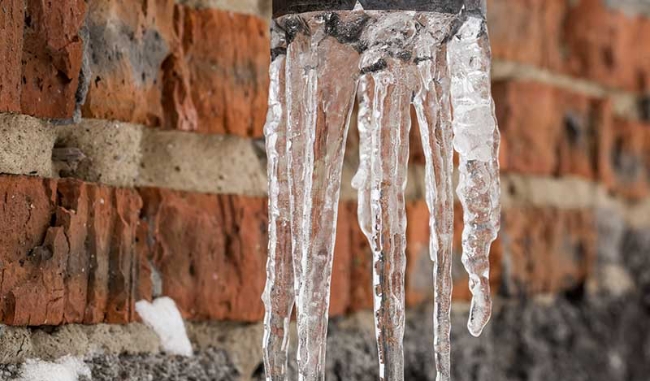Presented here on the next paragraphs you might get lots of really good expertise related to How to prepare your home plumbing for winter weather.

Cold weather can damage your plumbing, especially by freezing pipes. Right here's exactly how to prevent it from happening and what to do if it does.
Introduction
As temperatures decline, the threat of icy pipes increases, potentially bring about pricey repair services and water damage. Understanding just how to avoid frozen pipelines is critical for house owners in cold environments.
Comprehending Icy Pipes
What causes pipelines to ice up?
Pipes ice up when subjected to temperature levels below 32 ° F (0 ° C) for expanded periods. As water inside the pipelines ices up, it expands, taxing the pipeline walls and potentially triggering them to rupture.
Dangers and damages
Icy pipes can lead to water supply disruptions, residential or commercial property damage, and pricey repair services. Burst pipelines can flood homes and create substantial structural damages.
Signs of Frozen Piping
Determining icy pipes early can stop them from rupturing.
Exactly how to identify frozen pipelines
Search for lowered water flow from faucets, uncommon smells or noises from pipelines, and noticeable frost on exposed pipes.
Avoidance Tips
Shielding susceptible pipes
Cover pipelines in insulation sleeves or use heat tape to safeguard them from freezing temperature levels. Concentrate on pipes in unheated or external locations of the home.
Home heating methods
Keep interior areas appropriately warmed, specifically areas with plumbing. Open cabinet doors to enable cozy air to circulate around pipelines under sinks.
Safeguarding Outdoor Plumbing
Yard pipes and exterior faucets
Detach and drain garden pipes before winter season. Mount frost-proof spigots or cover exterior taps with shielded caps.
What to Do If Your Pipes Freeze
Immediate activities to take
If you suspect frozen pipelines, maintain faucets available to relieve pressure as the ice melts. Make use of a hairdryer or towels taken in hot water to thaw pipelines gradually.
Long-Term Solutions
Structural modifications
Take into consideration rerouting pipes away from exterior wall surfaces or unheated areas. Include additional insulation to attic rooms, cellars, and crawl spaces.
Updating insulation
Buy premium insulation for pipes, attics, and walls. Proper insulation helps maintain consistent temperatures and lowers the threat of icy pipes.
Conclusion
Avoiding icy pipelines needs proactive actions and fast reactions. By understanding the reasons, indications, and preventive measures, homeowners can secure their plumbing throughout cold weather.
Helpful Tips to Prevent Frozen Pipes this Winter
UNDERSTANDING THE BASICS: WHY PIPES FREEZE AND WHY IT’S A PROBLEM
Water freezing inside pipes is common during the winter months, but understanding why pipes freeze, and the potential problems it can cause is crucial in preventing such incidents. This section will delve into the basics of why pipes freeze and the associated problems that may arise.
THE SCIENCE BEHIND FROZEN PIPES
When water reaches freezing temperatures, it undergoes a physical transformation and solidifies into ice. This expansion of water as it freezes is the primary reason pipes can burst. As the water inside the pipe freezes, it expands, creating immense pressure on the walls. If the pressure becomes too great, the pipe can crack or rupture, leading to leaks and water damage.
FACTORS THAT CONTRIBUTE TO PIPE FREEZING
- Low Temperatures: Extremely cold weather, especially below freezing, increases the risk of pipes freezing.
- Uninsulated or Poorly Insulated Pipes: Pipes located in unheated areas, such as basements, crawl spaces, or attics, are more prone to freezing. Insufficient insulation or lack of insulation altogether exacerbates the problem.
- Exterior Wall Exposure: Pipes running along exterior walls are susceptible to freezing as they encounter colder temperatures outside.
- Lack of Heating or Temperature Regulation: Inadequate heating or inconsistent temperature control in your home can contribute to frozen pipes.
PROBLEMS CAUSED BY FROZEN PIPES
WHY CERTAIN PIPES ARE MORE PRONE TO FREEZING
- Pipe Bursting: As mentioned earlier, the expansion of water as it freezes can cause pipes to burst, resulting in significant water damage.
- Water Damage: When pipes burst, it can lead to flooding and water damage to your property, including walls, ceilings, flooring, and personal belongings.
- Structural Damage: Prolonged exposure to water from burst pipes can compromise the structural integrity of your home, leading to costly repairs.
- Mold and Mildew Growth: Excess moisture from water damage can create a favorable environment for mold and mildew growth, posing health risks to occupants.
- Disrupted Water Supply: Frozen pipes can also result in a complete or partial loss of water supply until the issue is resolved.
https://busybusy.com/blog/helpful-tips-to-prevent-frozen-pipes-this-winter/
- Location: Pipes located in unheated or poorly insulated areas, such as basements, crawl spaces, attics, or exterior walls, are at higher risk of freezing.
- Exterior Pipes: Outdoor pipes, such as those used for irrigation or exposed plumbing, are particularly vulnerable to freezing as they are directly exposed to the elements.
- Supply Lines: Pipes that carry water from the main water supply into your home, including the main water line, are critical to protect as freezing in these lines can affect your entire plumbing system.
- Underground Pipes: Pipes buried underground, such as those connected to sprinkler systems or outdoor faucets, can be susceptible to freezing if not properly insulated.

I'm certainly very taken with Preventing and dealing with frozen pipes and I'm hoping you enjoyed the new page. So long as you enjoyed reading our article if you please don't forget to share it. Thank you so much for going through it.
Click Here To Read More
Comments on “Ways to Defend Your Pipes from Cold Weather: Professional Tips”